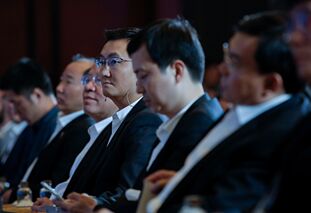腾讯加大与阿里巴巴竞争力度
|
Tencent ratcheted up its competition with Alibaba, claiming leadership in two key areas and signalling a further year of investment and acquisitions. The Shenzhen-based company, which has a market capitalisation of $560bn, has been on a buying and investment spree, building a portfolio of 600 companies in which it has stakes or owns. This week alone it has acquired shares in gaming company Ubisoft, German online bank N26 and a Chinese news aggregator.
Announcing a near-doubling of net income to Rmb20.8bn ($3.18bn) in the final quarter of the calendar year, Martin Lau, president and executive director, said on Wednesday the social media company now led the Chinese market in video and payments, in terms of monthly and daily average users. Tencent has rolled out an aggressive subsidy programme in an effort to woo merchants and investors to its payment platform, following a similar move by Ant Financial, the payments affiliate of Alibaba. Tencent warned of a negative short-term impact to profits as a result of the heavy spending. While Tencent topped analysts’ expectations on earnings it fell short on revenues, up 51 per cent at Rmb66.39bn on the back of online gaming. Operating margins rose to 39 per cent, from 32 per cent in the same period in 2016. The company also put investors on notice that 2018 would be another year of spending. Mr Lau identified five sectors: video, payments, cloud computing, artificial intelligence and smart retail, which combines ecommerce and bricks and mortar shops. He pointed to opportunities in the market, adding “obviously we have strong profit growth so we can really afford to make such investments. We feel every dollar invested today will generate more for the future.” The spending sprees by Tencent and Alibaba, which has also been ploughing money into retail and other sectors, comes as the previous wave of big spenders have had their wings clipped and are now divesting assets. Bankers and investors differentiate the tech groups’ spending, which is backed by strong balance sheets, from the strategy of previously acquisitive companies such as Anbang and HNA, which were often seeking trophy assets such as hotels and football teams. The battle in payments comes at an awkward time for Alibaba, which is restructuring its relationship with Ant by switching its profit-sharing arrangement for a 33 per cent equity stake. Pony Ma, Tencent chairman and chief executive, insisted the competition was “healthy”. In the case of payments, this meant helping foster a market that is far and away the biggest in the world. Benjamin Wu, analyst at Pacific Epoch, welcomed Tencent’s continued spending, saying that while it would lower margins it would also accelerate expansion. He added the company and Alibaba would follow different paths, with the latter looking more overseas. “We think Tencent can spread its payments to lower-tier cities [in China], like tiers 5 and 6, and get faster expansion,” he said. |









